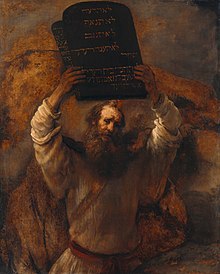Musa
 | |||||
| |||||
| Rayuwa | |||||
| Haihuwa |
Land of Goshen (en) | ||||
| ƙasa | no value | ||||
| Mazauni |
Misra Sinai Peninsula (en) Midian (en) | ||||
| Ƙabila |
Israelites (en) | ||||
| Mutuwa |
Mount Nebo (en) | ||||
| Yanayin mutuwa |
Sababi na ainihi divine retribution (en) | ||||
| Ƴan uwa | |||||
| Mahaifi | Amram | ||||
| Mahaifiya | Jochebed | ||||
| Abokiyar zama |
Zipporah (en) Tharbis (en) | ||||
| Yara | |||||
| Ahali |
Aaron (en) | ||||
| Karatu | |||||
| Makaranta | unknown value | ||||
| Harsuna |
Canaanite (en) Harshen Misira Biblical Hebrew (en) | ||||
| Ɗalibai | |||||
| Sana'a | |||||
| Sana'a |
Shugaban soji, shugaban addini, legislator (en) | ||||
| Muhimman ayyuka |
Tablets of Stone (en) The Exodus (en) | ||||
| Feast | |||||
|
September 4 (en) | |||||
| Imani | |||||
| Addini |
chavista (en) | ||||


Musa da turanci Moses (furucci turanci|ˈ|m|oʊ|z|ɪ|z|,_|-|z|ɪ|s)[1][Note 1] Ya kasance Annabi ne a addinin Musulunci, kamar yadda littattafan addinai masu tsarki suka nuna; Sai dai, gamayyar Malaman ilimi na ganin Musa a matsayin wani legendary figure and bawai wani mutumin tarihi bane. kamar yadda littafi mai tsarki na Hebrew Bible yanuna, Musa yasamu riko ne a hannun Egyptian princess, sannan daga bisani yazama jagora kuma shugaban Israelites da kuma lawgiver, wanda shine wanda ya authorship littafi mai tsarki wato Torah, or acquisition of the Torah from Heaven is traditionally attributed. Also called Moshe Rabbenu in Hebrew (harshen |he|מֹשֶׁה רַבֵּנ, lit. "Moses our Teacher") shine mafi mahimmanci acikin annabawan Judaism.[2][3] Harwayau yana da mahimmanci a addinin Christianity, da Islam, da Bahá'í Faith, da kuma wasu daga cikin addinan other Abrahamic religions.
Acikin littafin Book of Exodus, An haife Musa ne a lokacin da mutanensa, wato Banu Isra'ila, bayine wadanda basu dayawa, suka farayin yawa sai fir'auna yafara jin haushi, domin zasu iya haɗa Kansu suyi gamayya da makiyan Misira.[4] Mahaifiyar Hebrew Musa, Jochebed, Sai tayi maza ta boyesa a sanda taji cewar fir'auna yayi umurnin a fara kashe yara maza da aka haifa daga kabilar yahudawan Isra ilawa, saboda hakan zaisa yawan al'umman mutanan Isra'ila yadaina karuwa. Sai dai ta hannun yar'fir'auna (identified as Queen Bithia a Midrash), sai aka tsince shi foundling a kogi Nile river kuma yagirma a fadar masarautar misira tareda fir'auna. Bayan kashe wani bawa daga misira (because the slavemaster was smiting a Hebrew), Musa ya hudu ya tsallake Red Sea zuwa Midian, inda ya gamuda Mala'ika da ubangiji,[5] yana masa magana daga wani wurin dake ci da wuta akan dutsen Mount Horeb (wanda yake kira da dutsen Allah).
Allah ya umurci Musa komawa zuwa garin Misira (Egypt) domin ya nema adaina bautar da mutanen Garin Isra'ila. Musa ya nemi afuwa daga Ubangiji cewar A turashi tare da dan'uwansa Haruna, domin bazai iya magana da kyau ba,[6] sai Allah yabar dan'uwansa Haruna, wanda zaiyi magana a madadinsa. Bayan Ten Plagues, Musa ya jagoranci Exodus of the Israelites FITA daga Misira da tsallake ruwan maliya, bayan nan sai suka yada zango a Mount Sinai, anan ne Musa yakarba Ten Commandments daga ubangiji. Bayan shekaru arba'in (40) suna yawuce yawuce a sahara, Musa ya mutu wajan sight of the Promised Land akan Mount Nebo.
Jerome gives 1592 BCE,[7] and James Ussher 1571 BCE as Moses' birth year.[8] Augustine records the names of the kings when Moses was born in the City of God:
Orthopolis reigned as the 12th King of Sicyon for 63 years, from 1596–1533; and Criasus reigned as the 5th King of Argos for 54 years, from 1637–1583.[10]|group="Note" In the Book of Deuteronomy, Moses was called "the man of God".[11]
Manazarta
[gyara sashe | gyara masomin]- ↑ "Moses". Random House Webster's Unabridged Dictionary.
- ↑ Bibleref |Deuteronomy|34:10|KJV
- ↑ Citation | author= Maimonides | author-link = Maimonides | title = 13 principles of faith | at = 7th principle| title-link = Maimonedes#The 13 principles of faith.
- ↑ Exodus 1:10
- ↑ cite book |author=Douglas K. Stuart |year=2006 |title=Exodus: An Exegetical and Theological Exposition of Holy Scripture |url= |location= |publisher=B&H Publishing Group |pages=110–13 |isbn= |author-link=
- ↑ Exodus 4:10
- ↑ Jerome's Chronicon (4th century) gives 1592 for the birth of Moses
- ↑ The 17th-century Ussher chronology calculates 1571 BC (Annals of the World, 1658 paragraph 164)
- ↑ St Augustine. The City of God. Book XVIII. Chapter 8 – Who Were Kings When Moses Was Born, And What Gods Began To Be Worshipped Then.
- ↑ Citation | first = Herman L | last = Hoeh | url = http://cgca.net/coglinks/wcglit/hh_cmpndm1.txt | title = Compendium of World History | volume = 1 | type = dissertation | publisher = The Faculty of the Ambassador College, Graduate School of Theology, 1962 | year = 1967}}.
- ↑ Cite web|url=https://en.wikisource.org/wiki/Bible_(King_James)/Deuteronomy#Chapter_33%7Ctitle=Deuteronomy 33 (King James Bible)|publisher=|via=Wikisource
- ↑ Hebrew: מֹשֶׁה, fassara|hebrew|Moshe) ISO 259-3 fassara|hebrew|Moše}}; harshen-syr|ܡܘܫܐ) Mūše; Harshen-ar|موسى}} fassara|ar|DIN|Mūsā); harshen-el|Mωϋσῆς) fassara|grc|Mōÿsēs)
Bibiliyo
- Asch, Sholem (1958), Moses, New York: Putnam, ISBN 978-0-7426-9137-7.
- Assmann, Jan (1997), Moses the Egyptian: The Memory of Egypt in Western Monotheism, Harvard University Press, ISBN 978-0-674-58738-0.
- Peter Barenboim, "Biblical Roots of Separation of Powers", Moscow, 2005, ISBN 5-94381-123-0,
- Barzel, Hillel (1974), "Moses: Tragedy and Sublimity", in Gros Louis, Kenneth RR; Ackerman, James S; Warshaw, Thayer S (eds.), Literary Interpretations of Biblical Narratives, Nashville: Abingdon Press, pp. 120–40, ISBN 978-0-687-22131-8.
- Blackham, Paul (2005), "The Trinity in the Hebrew Scriptures", in Metzger, Paul Louis (ed.), Trinitarian Soundings in Systematic Theology (essay), Continuum International.
